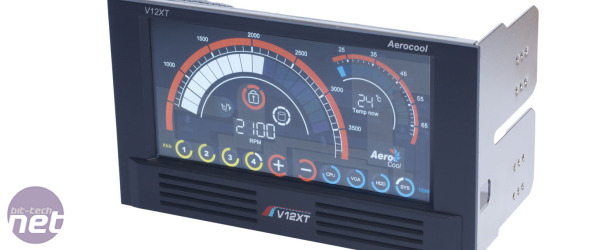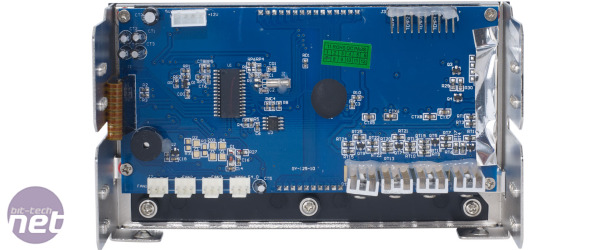
Aerocool V12XT Review
Manufacturer: AerocoolUK price (as reviewed): £40 (inc VAT)
US price (as reviewed): $62.98 (ex tax)
Fan controllers always seem like a great idea; they give you flexibility in your cooling and they can add a little bit of bling to the front of a case - if you’re into that sort of thing. In practice, though, they can often disappoint, either through being indecipherably complex or because they look like they’ve been styled by a captive 16 year old on a Methamphetamine drip.
We’re always open to having our opinions changed, though, so, without further ado, let's introduce the Aerocool V12XT.
The controller got off to a good start - it’s solidly built and the fascia, despite being made from plastic rather than aluminium, is sturdy and attractive. The V12XT is only available in black, however, so it will look out of place if you have a silver case.
Dominating the front of the V12XT is its 5in resistive touchscreen. Touchscreens can be a great inclusion on fan controllers, as they do away with the need for intrusive software interfaces or bulky buttons on the unit itself. As with mobile phones and tablet devices, though, the V12XT would benefit from a capacitive screen as, while more expensive, they're easier to use and more sensitive to inputs.
The layout of the screen itself is pretty full-on, with two brightly coloured dials taking pride of place and lending the screen a slightly over-styled sports car dashboard feel. The larger of the two dials is used to display the current speed of whichever of the four connected fans is currently selected. Tapping this allows the speed of the fan to be adjusted via the + and - buttons at the bottom of the screen.
The secondary, smaller dial shows the current temperature of whichever of the four temperature probes is selected. Tapping this dial enables you to set the thermal alarm threshold for the sensor, which is the point at which the V12XT spins the fan linked to that sensor up to its full speed. It’s a simple system, and one that means you need to make sure you’ve wired up your temperature probes and fans correctly - there's little point in your CPU cooler fan spinning up to full speed if it’s your hard disk that’s overheating.
This system also means you don’t have to faff around with cooling curves, though the downside of this is that there's no gradual increase in fan speed - they just suddenly jump up to full speed when the decided upon temperature is reached.
Unfortunately, while setting up the V12XT, we quickly found out that the screen isn't that great. Its viewing angles are bizarre, with the screen looking dull and lifeless when viewed head on and the touch sensitive panels behind the screen being clearly visible. Things improve slightly when looking down on the V12XT (as you would be if it were installed in a PC you kept under your desk), but even then the unlit sections of the screen become clearly visible, meaning it’s difficult to tell what the screen is actually telling you.
Aerocool has thoughtfully included a button to turn off the awful screen - a useful addition if your PC is in your bedroom and you like to leave it switched on. A final nice touch is the lock button, which sits just above the fan RPM readout. This has to be pressed before any changes can be made to the settings of the device, meaning you can’t accidentally muck up your settings when reaching for your optical drive's eject button.
Conclusion
The Aerocool V12XT is a missed opportunity. Functionally, of course, it's fine: it controls your fans simply and easily. Admittedly, this may not be quite enough for those with water-cooling (who are likely to want a little more granularity over cooling and noise levels than the V12XT can offer) but for everyone else, especially those experimenting for the first time, its simplicity is a boon.Unfortunately, to use the V12XT you’ll have to interact with its screen, which is by far its weakest (and annoyingly most visible) link. It’s got awful viewing angles and it takes a fair amount of pressure for it to register an input. As a result, we can’t recommend the V12XT in its current guise.
-
Design21 / 35
-
Features18 / 35
-
Value17 / 30


MSI MPG Velox 100R Chassis Review
October 14 2021 | 15:04










Want to comment? Please log in.